No products in the cart.
Hood Filter Cleaning
The Importance Of Kitchen Hood Filter Cleaning
Anyone that’s worked in a well-run kitchen can attest that cleaning hood filters is an often un-fun task (without the A1 Filter Box, at least). If your grill guy or kitchen manager is wondering why cleaning these filters is necessary, here are three important reasons you can share with them.
Three Reasons Hood Filter Cleaning Isn’t Negotiable
1 – Fire Risk
The first and most important reason your filters need to be regularly cleaned is the very real risk of a kitchen fire. Since the filters store grease from the steam that rises from your cooking equipment, it is not at all out of the realm of possibility that they could broker or cause a grease fire above your cooking equipment.
While that sounds like a nightmare already, the reality is likely worse than you might imagine.
For starters, no grease fire is easy or fun to fight. While most commercial hoods are equipped with a foam retardant system that engages just after a fire is detected, that isn’t always a sure bet to put out a grease fire in a vertical exhaust system.
Even if that does work, your kitchen and cooking equipment will now be covered in a layer of chemical foam and you’ll likely not have a working exhaust hood.
The potential damages to your business are numerous. Not only can the building be shut down for hours, days, or weeks, but you could also deal with a public backlash from the lack of safety precautions taken in your restaurant.
Worse still, people could get hurt in such an incident, which is most likely to occur during business hours.
2 – Clogged Filters Don’t Allow for Proper Airflow
If you’ve ever coughed from grill smoke or spices used in the kitchen at a restaurant, that is a clear sign that hood filters have been neglected. In addition to the worst-case scenario risk of fire, the everyday damages of hood filters not properly allowing for airflow due to a lack of routine cleaning can greatly impact the customer experience.
While the primary job of the hood filter is to capture grease generated by fryers, grills, and other kitchen equipment as the exhaust system pulls them out of your restaurant, the secondary job is to allow for everything else in the exhaust to exit the building.
A cloud or smell of smoke, cleaning chemicals, spices, and more is likely not what you have in mind for the ideal customer experience.
Plus, the lack of airflow can create an ideal breeding ground for bacteria and viruses that could cause major health concerns for your restaurant’s patrons. The potential health risks to reduced airflow alone could cause a major incident at your restaurant without a clear solution as to what even went wrong.
3 – It’s the Law
Every aspect of a commercial kitchen’s hood is covered by local ordinances in nearly every part of the country. Including your hood filters, the ducts, fans, and hood itself are all required to be thoroughly cleaned at different intervals by most health departments.
If your team is lacking motivation for cleaning the hood filters, point out that the two reasons above make the health and safety risk to the public great enough that your restaurant could be closed down due to improper hood cleaning standards.
Adhering to these guidelines is an important part of managing a commercial kitchen. We advise creating daily, weekly, and monthly cleaning tasks for your team to complete plus scheduling all necessary third-party hood exhaust cleaning appointments well in advance to ensure your kitchen is always well-within compliance levels.
It Doesn’t Have to Be Hard
Just because something needs to be cleaned regularly doesn’t mean it has to be hard to do. By using the A1 Filter Box, your team can quickly and easily keep up on regular hood filter cleaning without disrupting the usual workflow.
If your team is struggling with cleaning filters or cutting corners on ensuring they’re actually clean before putting them back into place, the A1 Filter Box could be a perfect solution to make this important maintenance less of a burden on your team.
Interested in learning more? Check out our shop page to browse available filter box models!

